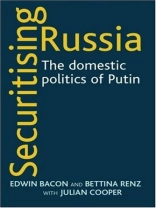Securitising Russia shows the impact of twenty-first-century security concerns on the way Russia is ruled. It demonstrates how President Putin has wrestled with terrorism, immigration, media freedom, religious pluralism, and economic globalism, and argues that fears of a return to old-style authoritarianism oversimplify the complex context of contemporary Russia.
The book focuses on the internal security issues common to many states in the early twenty-first-century, and places them in the particular context of Russia. Detailed analysis of the place of security in Russia’s political discourse and policy-making reveals nuances often missing from overarching assessments of Russia today. To characterise the Putin regime as the ‘KGB-resurgent’ is to miss vital continuities, contexts, and on-going political conflicts which make up the contemporary Russian scene.
Securitising Russia draws together current debates about whether Russia is a ‘normal’ country developing its own democratic and market structures, or a nascent authoritarian regime returning to the past.
Mục lục
Introduction
1. Approaches to contemporary Russia
2. The security forces
3. The Chechen conflict
4. The media
5. Civil society
6. Migration
7. The economy
8. Conclusion
Select Bibliography
Giới thiệu về tác giả
Julian Cooper is Professor of Russian Economic Studies in the European Research Institute at the University of Birmingham












